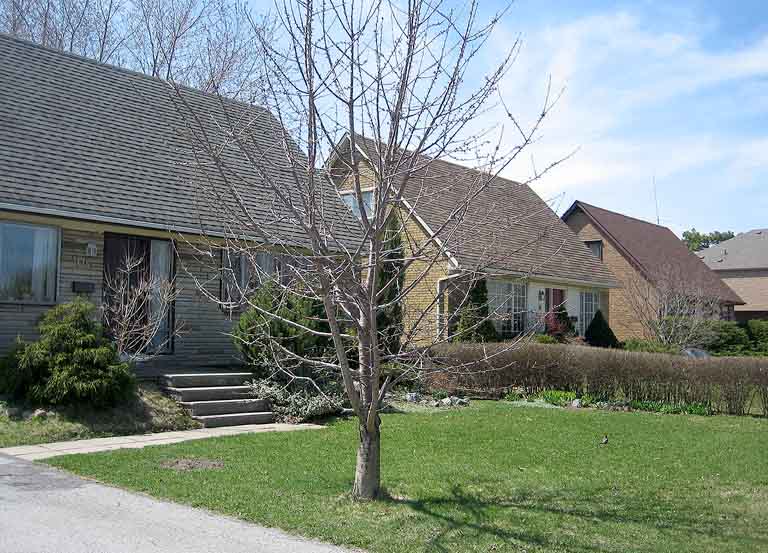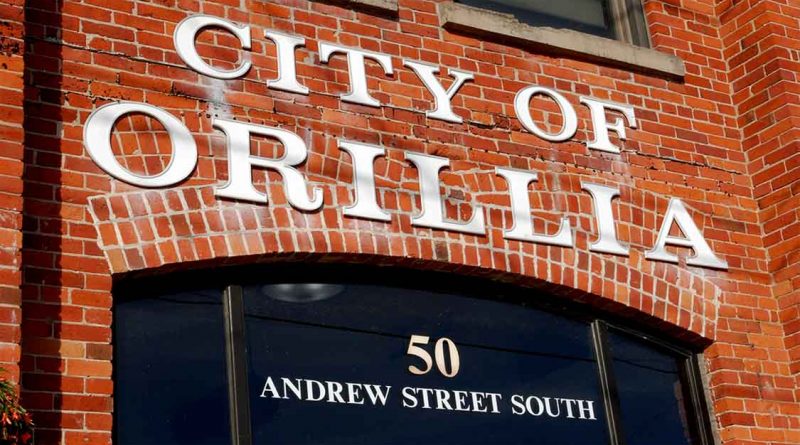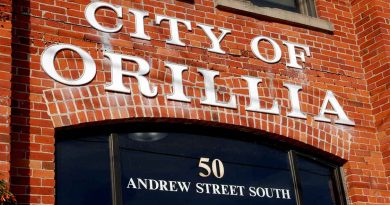Council Preview
Corrected
By John Swartz
Monday’s 2 p.m. Orillia council meeting will move briskly into a closed session. There are no deputations or presentations, and other than the formalities of starting the meeting, approving minutes and declarations of interest we’ll only see their faces on the screens for a few minutes and then a title card saying they’ll be back – sometime.
Council chambers are being renovated so the meeting can only be watched, or monitored online. The closed session agenda is for one item regarding and update of the 911 central emergency reporting bureau and is in closed session for legal, personnel and negotiation reasons.
When council goes public again, the first item under reports is a recap by councillors Fallis, Durnford, Leatherdale and Czetwerzuk of May’s Federation of Canadian Municipalities Conference held in Toronto .
The report is comprehensive in a way not seen before, except for councillor Durnford’s first report to council of her attendance at an ending homelessness symposium in Toronto last May. It was also filed quickly, which was also new phenomenon.
This report is well organized and flags which councillors attended which sessions. One area that caught the eye was in a session councillors Czetwerzuk and Fallis attended on housing.
One piece of information was “Globe and Mail Article identified that a “War-time effort is needed to move people into housing.””
This is a thought this writer had several weeks ago about how quickly we forget history. During the latter stages of World War II, 16,000 Victory Homes were built in Canada by mid-1943, and another 30,000 to accommodate returning vets and their families at the close of the war.
We have many of these in Orillia in the neighbourhoods near Memorial Avenue and Barrie Road. Many communities including Sarnia, Cambridge (Preston) and Kitchener also have such neighbourhoods built to accommodate those moving from farms to cities to work in wartime manufacturing, and can easily seen and identified in the neighbourhoods surrounding the former Canadian Forces Base London.

These 1200 sq. ft 1 ½ story, three bedroom houses were mass produced (all the same design), cheap to build and have stood the test of time. Over time homeowners have modified their homes and changed the looks, but if one knows what to look for you can find entire streets of the exact same house.
So while the Ontario Government takes prime farmland and environmentally necessary land to build expensive custom homes on (when there already is an equal amount of land in municipalities in Ontario already zoned and ready for development which will satisfy the premier’s goal of home building), why no one is taking about a Victory Home style wave of house building is a mystery. Meanwhile politicians are trying to reinvent the wheel, and deniers and advocates a like point to a variety of other factors driving up housing prices (which are all not irrelevant) and no one is building housing in the volumes needed.
Their report is 17 pages in length and the councillors noted some valuable information which hopefully influences their perspective regarding Orillia issues.
Next councillor Fallis has a report regarding Orillia’s most expensive parking lot, lot 15 on Front Street, to lower the $3 per hour charge to $2. Considering its is a temporary lot built in a place that was available, but not necessarily useful to either downtown shoppers or waterfront users. This seems reasonable in light of The City recently raising rates (but not as much) to park in several other lots in the downtown.
Another report from councillor Durnford wants council to adopt a trial program allowing by-law officers to proactively enforce clean and clear by-laws. Currently staff works on a complaint basis.
Department Reports
Staff want council to approve applying for a CMHC Housing Accelerator Fund grant, which will be accompanied by a housing action plan and a needs assessment.
If communities can show, by way of building permits issued, and increase in housing construction, they can receive a $20,000 per unit base grant, augmented by and additional amount ranging from $7,000 to $15,000 per unit and another $19,000 if units are designated affordable. These grants are retroactive to April 2022. The grants are to help municipalities cover costs (infrastructure) related to building housing.
Staff also have a report asking council to designate September 30 as National Day for Truth and Reconciliation. Doing so would mean The City would close for the day like any other holiday.
The Puck Stops here
Brian Orser Arena is getting some renovating. Staff’s report asks the project designer, Moon Matz Ltd., be authorized through a non- standard procurement to proceed with additional design elements, and to increase the budget up to $140,000, and that the overall budget of $12,400,000 be referred to the 2024 budget deliberations.

The arena is 50 years old. The COVID delayed design phase is almost complete and the project is eligible and staff applied for a $6 million Green and Inclusive Community Buildings grant, but it has not been approved.
Reading the list of things to be replaced leaves the impression the plan is to keep the studs and proceed from there. Approving the budget increased to the designers will allow for tender-ready documents be available in the spring should council approve the overall budget.
Several years ago staff shifted to having everything set to go for tendering in the New Year, pending budget approval, instead of waiting for approval for final document preparation. This has likely saved the City millions of dollars over the years because as contractors schedules fill up for building season, so to do prices increase.
The alternative option presented by staff is to use the arena as is for two more seasons and close and demolish it.
Consent Agenda
The consent agenda contains correspondence received, with direction to department scrutiny, and reports generated from previous council meetings. These items pass, usually, with no discussion and one vote.
Of letters listed, one is from Lakehead University asking the City provide a grant of $9,000 towards the university hosting the Summer Institute on Economic Security and Local Resilience next July. The university is providing funding of $17,000 and the Social Science and Humanities Research Council (federal) requires a partnership amounting to 50% of the university’s contribution.
The university expects, “150 participants including mayors, economic developers, urban practitioners, private sector stakeholders and academia to discuss practical solutions and research results concerning economic security and development to promote local resilience in Canadian municipalities.”
In the report from July’s meeting, on item for confirmation approval and subsequent by-law enactment, relates to licensing short term rentals (Airbnb’s). The motion includes the addition of two letters received on the subject.
One letter writer supports in general the aim of council’s action, but objects to be required to post a sign on the property he has been operating as a bed and breakfast for several years. He states there are some unintended consequences to the objective of providing ease information to those who wish to make complaints about the operation or actions occurring at such a rental, namely, “The proposal to have a sign visible from the road may have the unwanted effect of attracting passersby onto private property to read the details. It could also result in area neighbours who had been unaware of the NTR (?) now making nuisance complaints.”
The same letter writer, also wants council to change license fees saying low volume operators who use their primary residence will not be able to afford the $2,000 fee, suggesting $1,000 is better.
The second letter writer also objects to signs because, “it is an invitation to rob empty homes and cottages.” The writer states the by-law targets all operators when the City should be using existing by-laws on the few causing problems, and to do so aggressively. The writer contends if a few are disobeying decent behaviour and flouting by-laws now, not much will change with a more restrictive by-law imposed on all.
Also objectionable is limiting licenses to 150 rentals, which infers the writer believes there more than 150 cases fitting the new definition (i.e. those renting out for a few months while working elsewhere, or those who rent family cottages out on a weekly basis when not being used by the owners).
The writer believes the program will cost the city more than they think, especially if the cost of legal challenges arise.
Not on the agenda but related to Airbnb’s and the cost of housing and the rent affordability crisis; why is it no one has made the connection to the rise in use of Aribnb by landlords to replace rental units coinciding with the astronomical rise in rents asked for? It is no secret that in the last few years many long term units have been converted to short term (why make a month’s rent when one can make multiples of that renting daily?). It seems odds makers would favour there being a causation and correlation between the two.
Enquiry Motions
There are four. Councillor Czetwerzuk wants staff to report to budget committee the feasibility and cost of changing the name of Centennial Drive to Lightfoot Drive. While this sounds noble, many communities had centennial projects culminating in 1967 which involved substantial public fundraising and bear the name to honour those contributions and mark a significant milestone. It seems more appropriate to rename a street with a generic name, like Front Street, than to rename a specially named road.
Councillor Leatherdale would like a budget report about installing a calisthenics exercise station in Couchiching Beach Park.
Councillor Lauer would like staff to report by October 16 on, “The rationale for the increased number of municipal beach swim advisories and an analysis of potential solutions to improve beach water quality including targeted storm water management strategies.”
Lauer also would like a report on the, “legal obligations imposed on members of Council during Public Planning Meetings with a special emphasis on what and when admissible opinion or evidence can be considered.”
The meeting can be watched on the City’s Youtube channel beginning at 2 p.m.
CORRECTION: information regarding the closed session originally published was removed and replace with the correct information.
(Photos by Swartz – SUNonline/Orillia; Images Supplied)




